What Are the Health Benefits of Dandelion Leaf & Root

Called Taraxacum officinale by botanists and dandelion by everyone else, this beautiful flowering plant is considered to be a weed. Still, dandelions are really the most nutritious and wholesome weeds of them all! So, what are the health benefits of dandelion? How can you use these plants? What vitamins and dietary minerals do they contain? Why should you drink dandelion root tea?
Read on to find the answers to all these and numerous other questions.
Nutritional Profile
First of all, not only are all parts of dandelion edible, but they are also extremely nutritious. It’s always a good idea to add this plant to your diet.
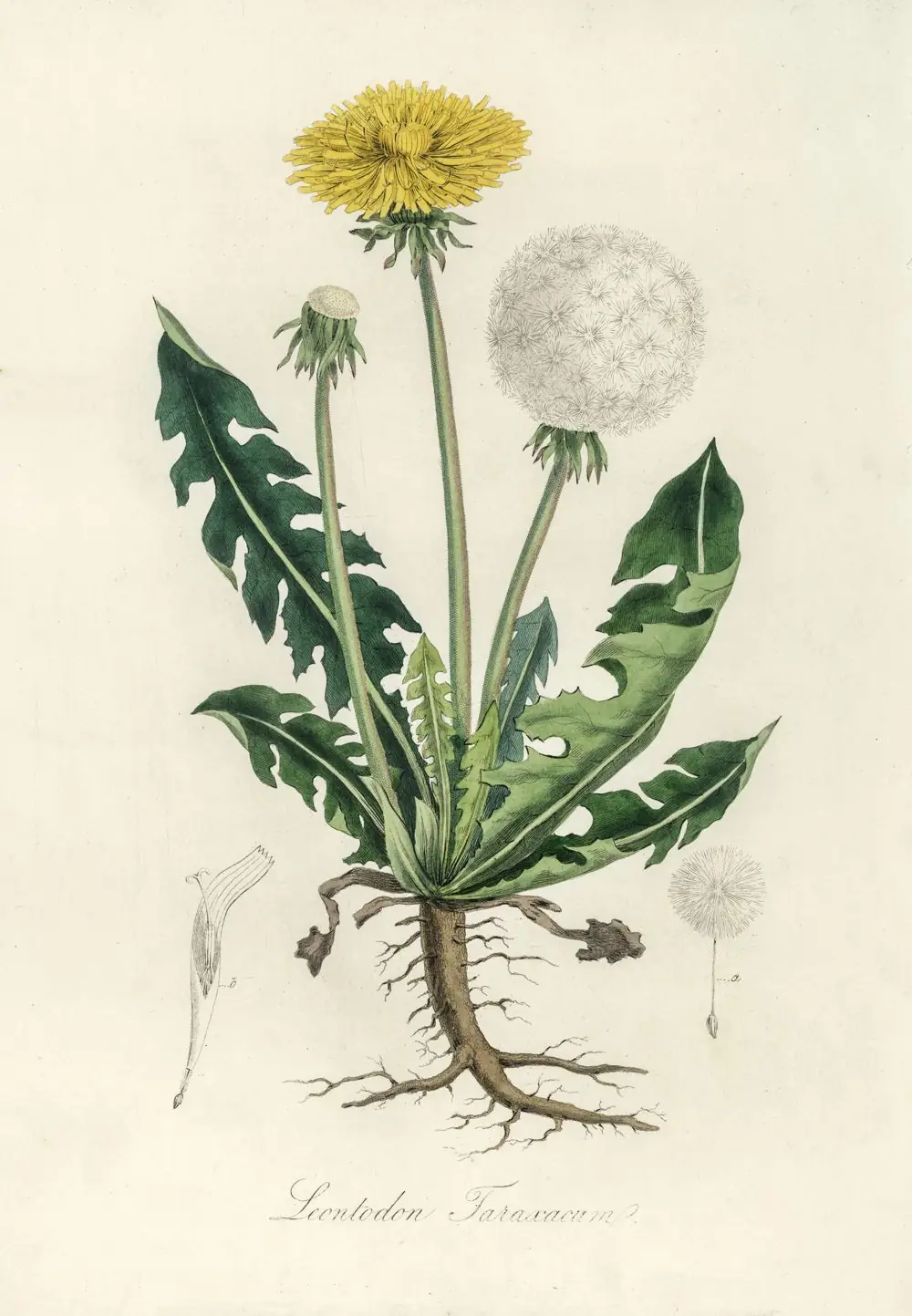
You can use the leaves and the yellow petals of the flower for your salads and sandwiches: they taste pleasantly fresh and tender, especially if harvested in spring. Green parts of dandelion are high in protein and dietary fiber; they also offer copious amounts of vitamin C as well as such important dietary minerals as iron, potassium, and magnesium. Leaves and stems of the plant are also a good source of beta carotene, a precursor of vitamin A.
As dandelion greens are also very rich in vitamin K and calcium, they can help you take care of bone health. This can be especially important for the elderly who are prone to bone loss.
The roots of dandelion are usually roasted (or dry-baked), ground, and used as a coffee substitute that is completely free of caffeine. You can also eat these roots raw: they are very rich in inulin, a well-known prebiotic (food for good bacteria that live in your gut and improve intestinal health). Summer is the best time for harvesting dandelion root as it tastes the most bitter from June to August.
What Are the Health Benefits of Dandelion Leaves & Flowers: Antioxidants
Both vitamins C and A that you get from dandelion greens are potent antioxidants that protect the cells of your body from damage caused by chemically active compounds called free radicals. Antioxidants improve your overall health, promote longevity, and help your skin stay flawless.
What’s more, the flower of the plant is rich in polyphenols which are also known for their antioxidant properties. For this reason, it is recommended that you eat your dandelion from stem to petals — and don’t forget about the root as well.
Additionally, several test-tube and animal studies suggest that dandelions may reduce inflammation in the body. There are also studies that prove that dandelion extract prevents viruses from replicating; this plant also contains antimicrobial compounds. Adding dandelions to your salads and enjoying dandelion leaf and root tea can help you boost immunity and effectively treat respiratory infections.
Dandelion Leaf & Root Tea by Traditional Medicinals
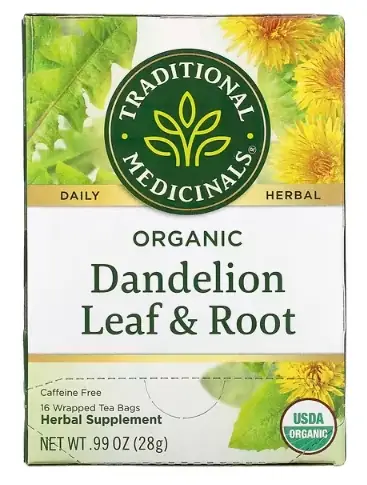
· 16 tea bags (1.75 grams of dandelion herb & root per bag)
· Mild diuretic
· Organic & caffeine free
· Dandelion supplement that comes from a reputable brand
What Are the Health Benefits of Dandelion Greens: Blood Pressure

Dandelion has been used in traditional medicine as a diuretic for a very long time. In fact, the English folk name of the plant “piss-a-bed” is a reflection of the alleged diuretic properties of the plant’s leaves. Still, while there are small-scale studies that confirm that dandelion leaf extract can increase urine output, additional research is needed.
Diuretic medications are known to reduce the amount of excess fluid in the body which in turn reduces blood pressure levels. Still, if you suffer from hypertension, it is strongly recommended that you consult with an experienced health practitioner rather than use dandelion plant.
Dandelions are also rich in potassium, an important dietary mineral that helps reduce blood pressure levels in the long term. It is recommended that people with hypertension add to their diets such potassium-rich foods as white beans, potatoes, beets, spinach, citrus fruits, bananas, avocados – and dandelions.
What Health Benefits Does Dandelion Have: Blood Sugar Lowering and Weight Loss
Dandelion contains bioactive compounds called chlorogenic and chicoric acids. Both these acids were demonstrated to improve the production of insulin and boost the absorption of glucose by the muscles. While additional research into the properties of chlorogenic and chicoric acids is required, it is believed that they can improve insulin sensitivity and reduce blood sugar levels, which is especially important for people diagnosed with type 2 diabetes and pre-diabetes.
Chlorogenic acid is also believed to decrease fat consumption and reduce body weight as confirmed by preliminary animal studies. While more studies are needed, and weight control properties of dandelion in humans are still being investigated, if you strive to lose pounds, using dandelion for your salads and drinking dandelion tea can only do you good.
Possible Health Benefits of Dandelion Tincture and Extract: Liver Support
In some animal studies dandelion extract protected mice and rats from liver damage and reduced levels of excess fat stored in the liver. However, no studies on humans were conducted, so if you have a liver condition, do not rely on dandelion alone to improve your symptoms.
What’s more, dandelion leaf extract was found to prevent skin damage caused by ultraviolet radiation. Animal studies also demonstrate that extract of dandelion may help increase skin hydration and boost collagen production, resulting in healthy smooth skin.
What Are the Health Benefits of Dandelion Root Powder & Coffee?
First of all, dandelion root (just like the plant’s flower) is a good source of polyphenols. What’s more, there are animal studies that demonstrate that dandelion root in your diet can markedly reduce the levels of cholesterol and triglycerides (key factors that lead to heart disease).
In several test-tube and animal studies dandelion root extract slowed the growth and development of cancer cells.
In a 2012 study the root of the plant was found to increase the number of new skin cells which is absolutely essential for skin health.
Dandelion root is rich in inulin, a type of dietary fiber that:
· gives bulk and mass to your stool and helps you enjoy regular bowel movements (especially if you are prone to constipation)
· increases absorption of such important dietary minerals as calcium and magnesium
· feeds good bacteria in your gut
· reduces the absorption of cholesterol.
This supplement that comes from a reputable brand is a great way to enjoy the benefits of dandelion root:
Dandelion Root by Nature’s Way
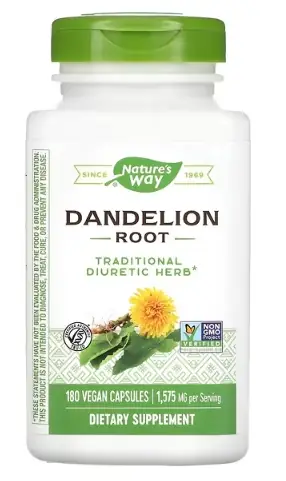
· 60 servings, 1.575 grams of ground root per serving
· Non-GMO
· No artificial preservatives or flavors
Benefits of Drinking Dandelion Tea
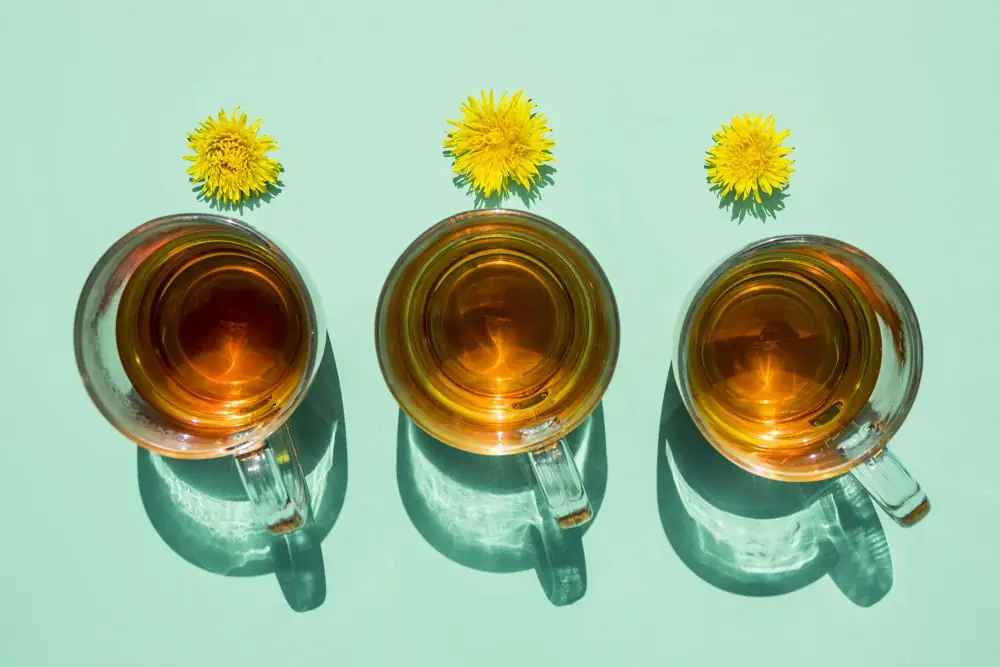
Overindulgence in coffee and other caffeine-rich beverages can result in nervousness, anxiety, and sleep problems. It is therefore recommended that you avoid drinking coffee in the evening: dandelion root tea (along with numerous other herbal teas) will be a much healthier alternative.
So, the final answer to the question: what are the health benefits you get from drinking dandelion tea, is that this tea is an excellent way to stay hydrated without experiencing symptoms of caffeine overstimulation. To enjoy this wholesome drink, you don’t really need to roast and grind actual dandelion roots — use this organic product instead:
Roasted Dandelion Root by Traditional Medicinals
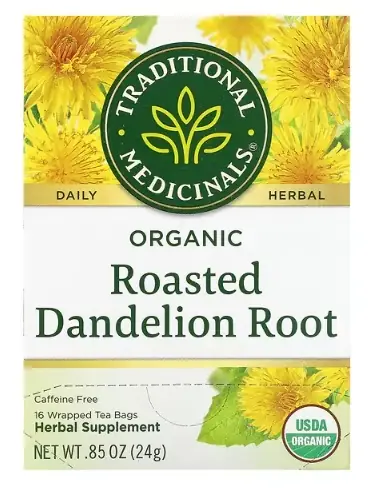
· 16 tea bags (1.5 grams of roasted dandelion root per bag)
· Organic & caffeine free
· Well-known brand
Potential Health Benefits of Dandelion Juice
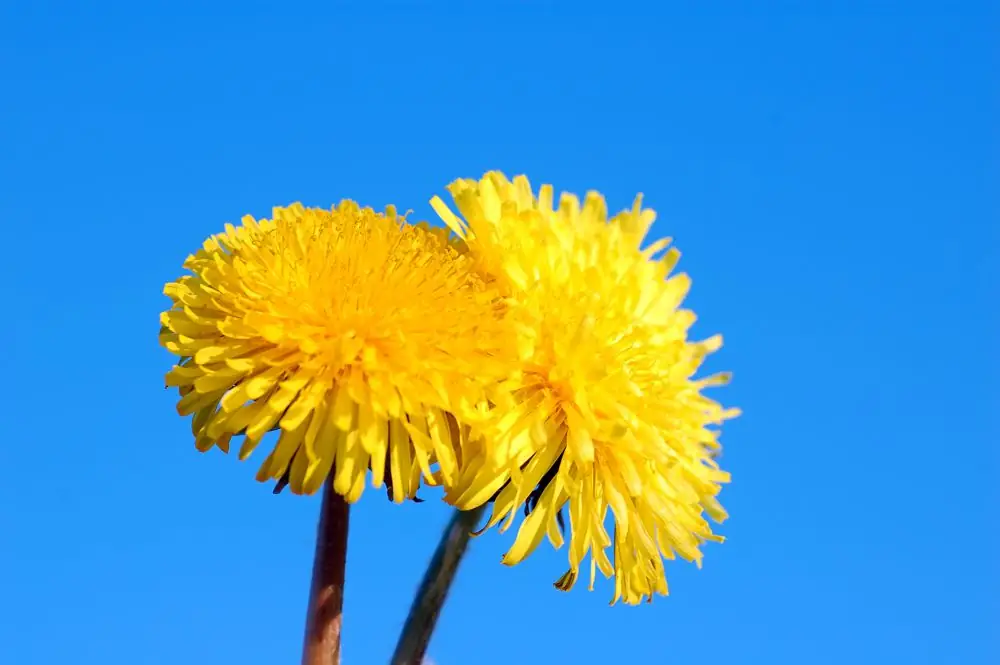
As the concentration of bioactive compounds in the juice is the highest, you might want to use it for your green shots. Keep in mind though, that juice lacks dietary fiber that dandelion is rich in: if you choose this option, make sure you get enough dietary fiber from other sources.
Here is some practical advice on juice extraction:
· To squeeze dandelion juice, you will need a juicer: any variety will do except for centrifugal ones that cannot handle leafy greens. Twin gear (triturating) juicers will work best.
· You will want to use young and new dandelion leaves because of their milder taste. Leaves of plants with flowers on them taste very bitter.
· Do not delay juicing. Use the leaves as soon as you have picked them: they get dry very quickly.
· Apples (2 medium) – oranges (2 medium) – lemon (1 medium) – dandelion (5 leaves) is one of the best-known recipes made with dandelion. You can also enjoy dandelion leaves juice on its own (a small shot will be enough).
· To avoid any potential side-effects, do not drink dandelion juice for more than 2 weeks.
Health Benefits of Eating Dandelion Jelly (or Honey)
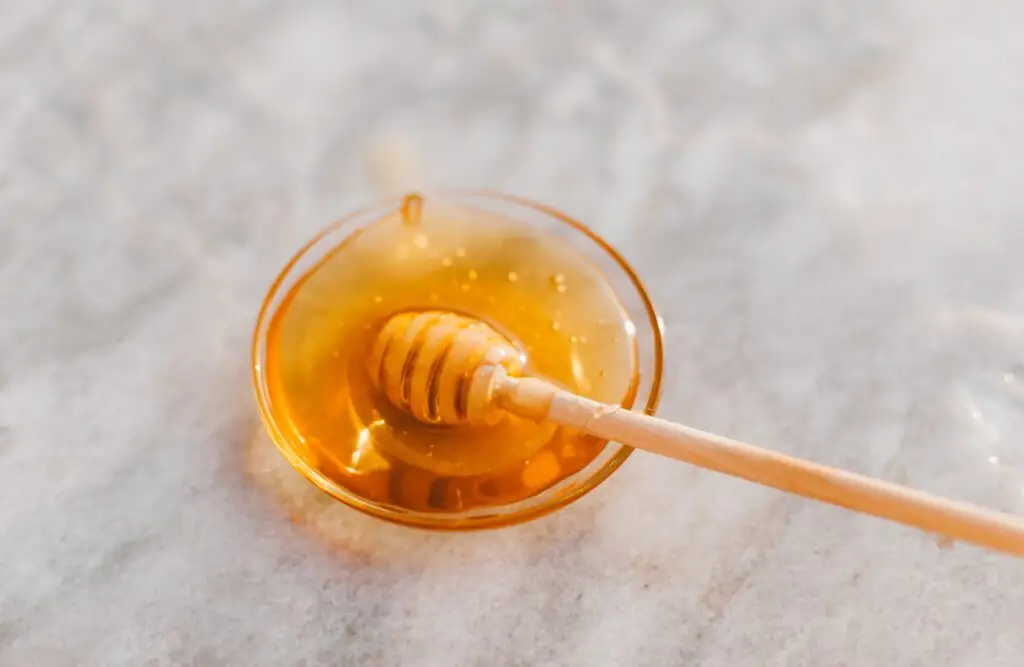
Dandelion jelly (also often called honey) is easy to make: its golden color is all about feeling optimistic. Pick dandelions for your jelly when the dew is still on their flowers — very early morning is the best possible time. You will only use yellow flowers: separate them from the green leaves. 3 cups of fresh dandelion blossoms will be enough.
Bring water (4 cups) to a boil in a medium saucepan. Add 1.5 cups of your blossoms, stir them, turn off the heat, cover the lid, and let your blossoms steep for 20 minutes. Strain your blossoms (you won’t need them anymore) and return dandelion water back to your saucepan. Bring it to a boil once again, add the remaining 1.5 cups of blossoms, let them steep and strain them.
Now you have about 3 cups of dandelion water. Add sugar (4 cups), powdered pectin (1 box), and lemon juice (2 tablespoons). Bring this water to a boil for the third time and stir it until the sugar dissolves completely. Let the water boil for about 1 minute and use a wooden spoon to skim off foam.
All that remains to do is pour your jelly into small jars (need to be sterilized) and leave some space at the top of each jar. Let the jelly cool and store it in the refrigerator.
This jelly (or honey) is very rich in vitamins (A and K), dietary minerals, polyphenolic antioxidants, and such bioactive compounds as chlorogenic and chicoric acids. The main drawback of dandelion jelly/honey is that it contains copious amounts of sugar: if you watch your weight or suffer from type 2 diabetes, you might want to avoid foods that are full of fast carbohydrates.
Health Benefits of Dandelion Wine
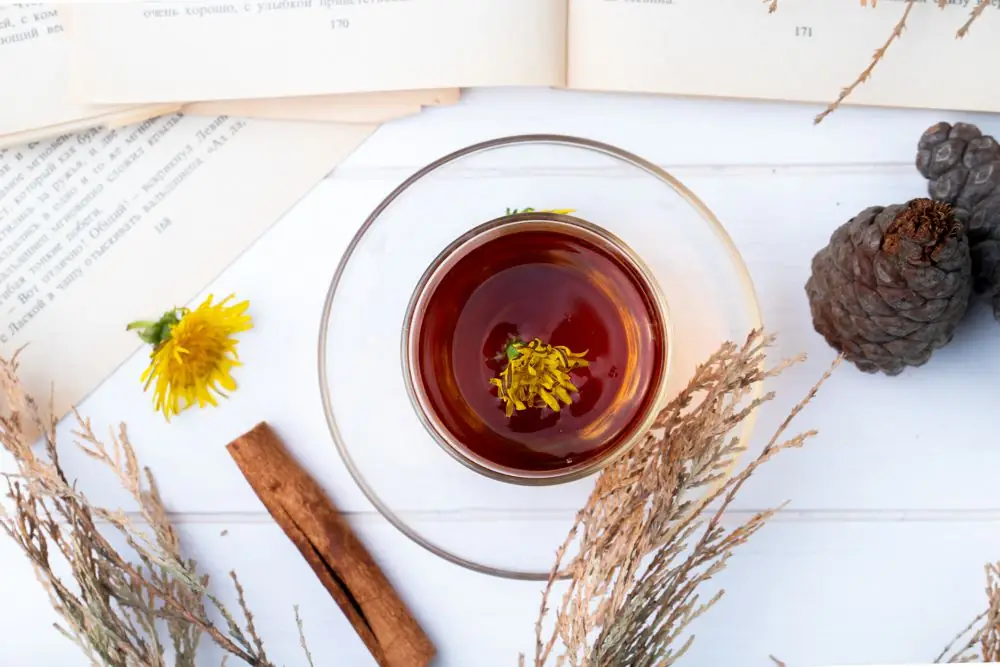
Dandelion wine is sweet and contains about 18% alcohol, which is significantly higher than most wines (about 12% alcohol) and beers (5% alcohol). To make it you will need the yellow blossoms without the green parts. While dandelion wine is aromatic and rich in polyphenolic and dietary minerals, its high alcohol content means that you should only drink small quantities of it. What’s more, it will take you a lot of effort and significant time (up to four months) to taste the wine you made.
All in all, while you might enjoy dandelion wine now and then, using fresh dandelions for your salads and enjoying dandelion tea are much more healthy alternatives to wine.
What Are the Possible Side Effects of Using Dandelion
Dandelion does not contain toxins and bioactive compounds called alkaloids that can have a toxic effect if taken in large doses. Still, allergic reactions can sometimes happen, especially if you are allergic to ragweed. Dandelion juice can provoke contact dermatitis in people with sensitive skin.
A 2013 scientific review recommends doctors closely monitor patients who use dandelion if they also take these medications:
· antihypertensive
· antidiabetic
· insulin.
Then again, the authors of this review admit that there are only minor concerns about dandelion safety, so adverse reactions are unlikely.
When it comes to the daily amounts of dandelion you can safely use, a 2016 review of dandelion properties lists these dosages:
· Leaves (fresh or dry): 4-10 grams
· Leaf tincture: 2-5 ml (½ to 1 teaspoon) three times a day
· Leaf juice (fresh): 5 ml (1 teaspoon) two times a day
· Fluid extract: 5-10 ml (1 to 2 teaspoons)
· Roots (fresh): 2-8 grams
· Roots (dried powdered): 250-1000 mg four times a day.
Now you know what are the health benefits of dandelion. Nutritious and high in vitamins and minerals, it deserves to be an important part of your daily diet!